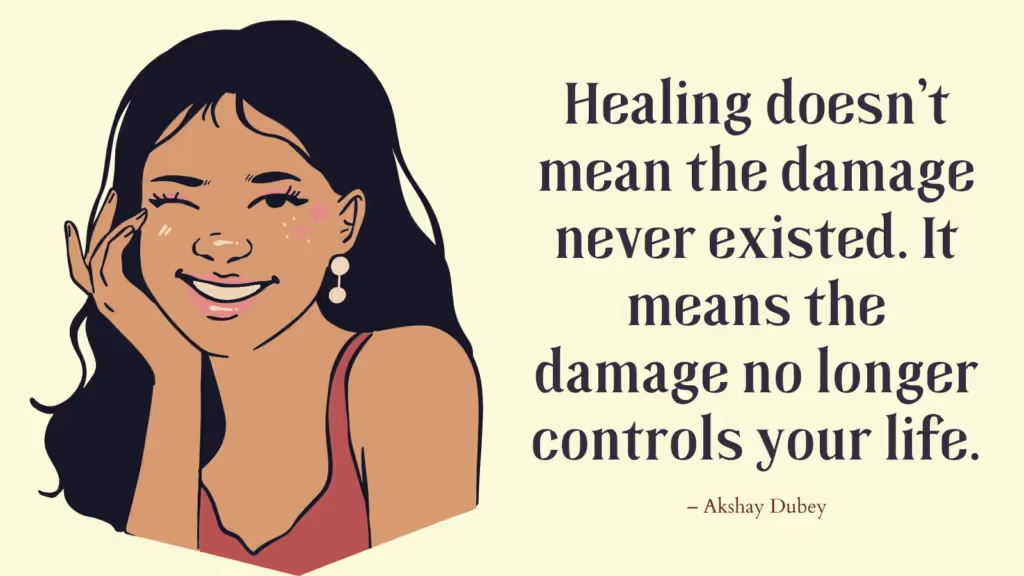Healing trauma is a difficult and arduous process, but it is possible.Trauma impacts every aspect of your life whether we recognize it as rooted in trauma...

Healing trauma is a difficult and arduous process, but it is possible.Trauma impacts every aspect of your life whether we recognize it as rooted in trauma or not.Just a few ways trauma impacts us is our perception of self, perception of the world, emotional regulation, style of argument, communication patterns, and fight or flight response.Trauma impacts our hormones and our central nervous system.For all these reasons, healing trauma is not only a good idea, but it's also necessary to live a fulfilling and healthy life.
Unfortunately, healing trauma means going through it, not around it. But that doesn't mean you have to jump headfirst into what happened. Healing trauma can start with some reflection questions about what you may be taking for granted about your life and your perceptions. Here are a few reflective questions to help you get started:
1) Do you have a growth mindset or a fixed mindset? (If you don't know, do a quick google search for Growth Mindset Quiz)
2) What role does suffering/hardship play in life?
3) What is happiness?
4) Who can be happy?
5) What is good, what is evil, and how do those things influence life?
These are some pretty heavy questions, but they'll help you develop a worldview. Having a worldview will help you identify yourself as a human being on the planet, and clarify your understanding of what that means. Compare these answers to how you would've answered these questions before your traumatic event.
Once you've done some self-reflection and identified some critical aspects of being alive, the next step is to identify the context.Healing trauma requires context.What do I mean by that?In the case of trauma, context means identifying the specific circumstances that were occurring when the traumatic event happened.Trauma tends to generalize outside of its particular context which has major implications for how we interact with ourselves and the world.For instance, a boy gets hit by a car while biking to soccer practice; the trauma was being hit by a car, but the boy generalizes that trauma outward to riding bikes and playing soccer.In the example, the context is that he was riding his bike and wasn't paying attention (or the driver wasn't), but that has nothing to do with soccer or riding bikes in general.So, going over what happened in as much detail as you can remember helps the mind heal by focusing on the context of the situation.That allows you to identify legitimate concerns for the event happening again, as opposed to what was going on by chance at the time that was unintentionally lumped in with the traumatic event.Using the example above, once the boy realizes that riding the bike, and playing soccer aren't inherently connected to being hit by a car, the boy can then reclaim those activities without fear and panic.

Approaching the techniques mentioned above for healing trauma sounds much easier than it actually is.So much of our mind is still in shock (hence it being traumatic) that the mere thought of something associated with the trauma is likely to spark discomfort, anxiety, or in some cases full-blown panic.This is why coping skills are so important.The mind wants to protect you from experiencing the traumatic event again. Still, it does a poor job of realizing the difference between investigating memory and re-experiencing something in real time.You can help your mind make this distinction through certain coping skills.The ability to consciously decide to remember the trauma, and investigate it, is what is called processing; processing is what heals.So, here is a list of coping skills that will help calm you down while you work on your internal investigations:
1) Physiological Sigh: 2 quick inhales through the nose, a long exhale through the mouth, do this in real-time whenever you feel anxious, fearful, worried, angry, or any other unpleasant emotion.
2) Present-mindedness: As you recall painful memories, pay attention to your breathing, or identify objects in your immediate area; being present-minded helps your brain recognize that memories aren't recurring and reminds you that you are safe despite remembering an unsafe event.
3) Journal: Writing down what you remember, how you felt then, how you feel now, and what that means to you is one of the greatest and oldest coping skills in human history.
4) Box Breathing: Box breathing inhaling for a certain count, holding for a certain count, exhaling for a certain count, and repeating those patterns; Inhale count to 5, hold for 5, exhale for 5, repeat.
5) Mantra: Create a personal message, a word or phrase, that is supportive encouraging or meaningful to you that you can repeat to yourself when you are under distress; "It wasn't my fault" "I'm safe now" "That was then, this is now" "I'm not that person anymore" "I am loved" "I am deserving of love" etc.
There are an endless amount of coping skills out there, doing a quick google search for Coping Skills will provide you with any number of effective tools.The trick is to find the ones that work for you.A coping skill above all else is something that calms you down and brings you back to the present moment.
Healing trauma is a difficult task.It takes a lot of focus, willingness to remember difficult things, and adequate coping skills.Reflection, context, and coping skills are all you need to successfully process trauma, but that may not mean you are ready.Give yourself time, patience, and above all else, love.Trauma can be healed, it does not have to rule your life.If processing your trauma isn't something you can handle on your schedule a meeting with a mental health therapist or finding a group online.Help is out there.Healing trauma is difficult, but it is possible, and it is life-changing.
Yes, it is possible for new triggers to emerge as you delve deeper into your healing journey. Discuss any new triggers with your therapist, who can help you develop strategies for managing them effectively.
Traditional therapy approaches may not adequately address the specific needs of clients with trauma histories. Trauma-informed care focuses on acknowledging and validating clients' traumatic experiences, creating a safe therapeutic environment, and providing targeted interventions that foster healing and resilience.
Yes. Trauma counseling can be adapted to suit individuals of all ages, including children and adolescents. It's important to address trauma in children as early as possible to prevent long-term effects on their mental health and development.
Trauma-informed care creates a safe and supportive environment that helps clients feel more comfortable sharing their experiences. By acknowledging and validating clients' traumatic experiences, therapists can build trust and rapport, leading to better engagement in therapy and improved outcomes.
Develop a self-soothing toolkit filled with comforting items or activities that can help calm and ground you during challenging moments. Utilize grounding and relaxation techniques to manage overwhelming emotions, and reach out to your support network for reassurance and encouragement.
If you're struggling with the effects of childhood trauma, there are many ways to get help.
You can talk to your partner about what you're going through, seek help from a therapist or counselor, join a support group, or take care of yourself both physically and emotionally.